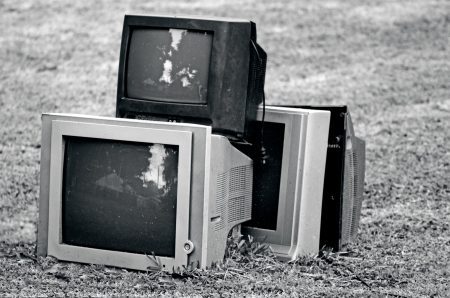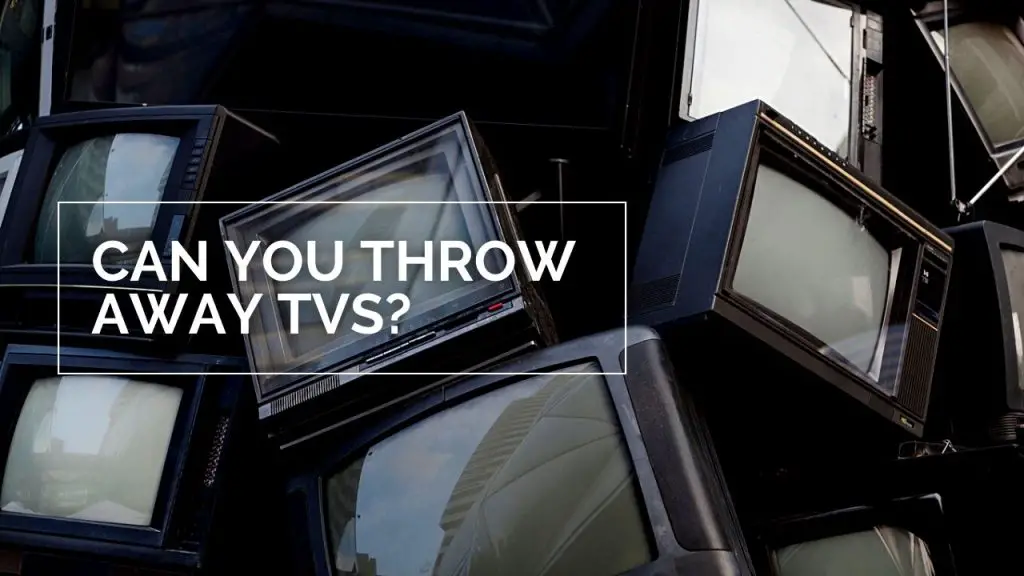Technically, you can throw away a TV, but it is not recommended as it is not an environmentally friendly option. Televisions contain lead, glass, and plastics that can harm the environment if not properly disposed of.
Additionally, many landfills do not accept TVs as they can take up a lot of space and be difficult to break down. If you want to dispose of your TV, recycle it or donate it to an organization that can use it or disposes of it in an Eco-friendly way.
Can You Throw Away A TV?
The best option for TV disposal is recycling, as it ensures that the materials are properly disposed of and can be reused in the future. Donating is also a good option if your TV is still in good working condition.
Curbside pick-up and haul-away services are convenient options but may come with additional costs. Landfill disposal is not ideal, but it may be necessary if all other options have been exhausted.
Here are your best options for TV disposal:
- Recycling: Many communities have recycling programs that accept old televisions. These programs ensure that the components of the TV, such as plastic, glass, and metals, are properly disposed of and recycled. This is often the most environmentally-friendly option.
- Donating: If your TV is still in good working condition, you can consider donating it to a local charity or non-profit organization. They may be able to use it or give it to someone in need.
- Curbside Pick-up: Some cities and towns offer curbside pick-up for large items, including televisions. Check with your local waste management department to see if this service is available.
- Haul-away Services: Many electronic retailers and appliance stores offer haul-away services for old televisions. This is a convenient option, as they will come to your home and take the TV away for disposal.
- Landfill: If none of the above options are available, you may take your TV to a landfill for disposal. This is not the most environmentally-friendly option, but it is possible if all other options have been exhausted.
Need a new television? These are the top 5 bestsellers on Amazon!
The Importance of Recycling Old Televisions
TVs have become an essential part of our daily lives, but when they reach the end of their lifespan, they often end up in landfills where they can cause significant environmental damage. Recycling old televisions is crucial to reducing the environmental impact of e-waste and preserving the planet’s resources.
One of the main reasons to recycle old televisions is to preserve natural resources. Many materials found in televisions, such as glass, plastic, and metals, can be reclaimed and used to make new products. This saves resources and reduces the need for mining, drilling, and other environmentally damaging activities.
Another benefit of recycling old televisions is preventing hazardous materials from entering the environment. Televisions contain lead, mercury, and cadmium, which can harm human health and the environment if not disposed of properly. Recycling these materials ensures that they are handled safely and responsibly.
Recycling old televisions also help to reduce the amount of waste sent to landfills. Televisions are large and bulky items that take up much landfill space, contributing to overfilled dumps and environmental pollution. Recycling old televisions can reduce the strain on landfills and help preserve our natural resources.
How to Find a Responsible Recycling Facility for Your TV
Finding a responsible recycling facility for your old television can be daunting. Still, ensuring that your TV is disposed of in an environmentally-friendly and safe manner is crucial. Here are some steps you can take to find a responsible recycling facility for your TV:
- Check with your local government: Many local governments offer recycling programs for electronics, including televisions. Contact your local waste management department to find out if they have a program in place and where to take your TV.
- Look for certified recyclers: Search for certified electronics recyclers in your area. Organizations such as e-Stewards and R2 (Responsible Recycling) certify recycling facilities that meet strict environmental and labor standards.
- Ask retailers and manufacturers: Many retailers and manufacturers offer recycling programs for their products. Check with the store where you bought your TV or the manufacturer of the TV to see if they offer a recycling program.
- Research online: Use the Internet to research local recycling facilities and read reviews from other customers. Look for facilities with a good reputation and take pride in their environmental and safety practices.
- Ask for documentation: Ask the recycling facility for documentation of their certifications, licenses, and insurance to ensure that they comply with state and federal regulations.
Once you have found a responsible recycling facility for your TV, it is important to properly prepare it by removing all personal information and disconnecting all the cables that came with it. By finding a responsible recycling facility, you can help protect the environment and ensure that your TV is disposed of safely and responsibly.

The Benefits of Donating Your Old TV
Donating your old television can benefit both the recipient and the environment. Here are some of the main benefits of donating your old TV:
- Helping those in need: Donating your old TV to a local charity or non-profit organization can provide a much-needed source of entertainment for those who cannot afford a new one.
- Reducing e-waste: By donating your old TV, you are keeping it out of the landfill and helping to reduce the amount of electronic waste in the environment.
- Supporting your community: Donating to a local organization helps support your community and its programs designed to benefit its members.
- Tax deductions: Donating your old TV to a qualified non-profit organization may be tax-deductible, thus allowing you to get some benefits in return.
- Reuse: Donating your old TV can help it find new life and be reused rather than being sent to a landfill, where it will decompose over time.
- Creating jobs: many non-profit organizations will refurbish donated electronics and resell them to generate funds that support the organization’s mission and create jobs.
When you donate your old TV, it is important to ensure the organization is reputable and has the resources to ensure that it will be used effectively. Research the organization online, and ask if they accept used TVs and how they use them; make sure to get a receipt, as it could be used for tax deductions.
How to Throw Away Your TV in an Eco-Friendly Way
Throwing away a TV in an eco-friendly way is important to reduce the environmental impact of electronic waste. Here are some tips on how to throw away your TV in an eco-friendly way:
- Curbside Pick-up: Some cities and towns offer curbside pick-up for large items, including televisions. Check with your local waste management department to see if this service is available.
- Haul-away Services: Many electronic retailers and appliance stores offer haul-away services for old televisions. This is a convenient option, as they will come to your home and take the TV away for disposal.
- Disassemble the TV: If none of the above options are available, and you have no other alternative but to discard your TV, make sure to disassemble it as much as possible. This will make it easier to recycle the individual parts and minimize the environmental impact.
- Erase all your data: Before discarding your TV, make sure to erase all your data. Electronic devices store a lot of personal information, so it’s essential to protect yourself from data breaches and identity theft by wiping all the data on the device.
It’s important to understand that the most eco-friendly way of disposing of a TV is to recycle or donate it, as it reduces the environmental impact and allows for the materials to be reused in the future. Landfilling should be the last resort. When recycling your TV, make sure to find a reputable recycling facility that uses environmentally-friendly methods and follows the proper regulations.
What Happens to Televisions After They’re Thrown Away
When televisions are thrown away, they can either end up in a landfill or a recycling facility. The outcome depends on whether the television was properly disposed of or not.
- Landfill: If a television is thrown away in a landfill, it will take up a significant amount of space, and the materials in the TV will not be properly recycled. This can release hazardous materials such as lead, mercury, and cadmium into the environment. Landfills are not designed to break down electronics, so televisions will decompose over time, releasing harmful chemicals into the soil and water.
- Recycling Facility: If the television is properly disposed of by being taken to a recycling facility, it will be dismantled, and the materials will be separated and recycled. The plastic, glass, and metal components can be reused to make new products, reducing the need for new resources and preserving the environment.
- Incineration: Televisions are also sent to Incineration plants where they are burned; this method is applied to Televisions that have toxic materials and cannot be dismantled to be recycled; the incineration process reduces the volume of waste by 90% and produces energy.
It’s crucial to understand the impact of disposing of televisions in the wrong way. Landfilling is not an environmentally-friendly option, and it can release hazardous materials into the environment. Recycling, donating, or sending the TV to incineration are the best alternatives; they help reduce electronic waste’s environmental impact and preserve the planet’s resources.
The Importance of Proper E-Waste Management
E-waste, or electronic waste, includes televisions, computers, cell phones, and other electronic devices that have reached the end of their useful life. Proper e-waste management is crucial to protect the environment and human health. Here are a few reasons why proper e-waste management is important:
- Protecting the environment: Improper disposal of e-waste can lead to releasing hazardous materials into the environment. When electronic devices are not properly recycled, they can release toxic chemicals such as lead, cadmium, and mercury into the soil and water, harming human health and the environment.
- Conserving resources: Proper e-waste management helps to conserve natural resources by reusing and recycling materials from old electronic devices. This reduces the need for new resources, such as metals and plastics, and helps to preserve the planet’s resources for future generations.
- Reducing waste: E-waste is a significant problem and a significant source of waste in landfills. Proper e-waste management helps reduce the amount of waste sent to landfills and helps preserve the environment by reducing the need for new landfills.
- Creating jobs: E-waste recycling and management create jobs, a vital sector of the economy. Properly disposing of electronic devices creates jobs in the recycling industry, which can benefit the economy and society.
- Data protection: E-waste management helps to protect personal data stored on electronic devices. When electronic devices are properly recycled, data is erased, and personal information is protected from being exposed to malicious actors, avoiding data breaches and identity theft.
Proper e-waste management is essential to protect the environment and human health, conserve resources, reduce waste, and create jobs. We must take responsibility for our electronic devices and properly dispose of them when they end their useful life. This can be done by recycling, donating, or incinerating them and finding a responsible recycling facility that uses environmentally-friendly methods and follows the proper regulations.
Conclusion
TV disposal is an important issue that affects the environment and our daily lives. It’s important to understand the consequences of improper TV disposal and the various options available to dispose of old televisions in an environmentally-friendly way.
Recycling and donating are the most eco-friendly options, as they reduce the environmental impact of electronic waste and preserve resources. Landfilling should be avoided as it’s an environmental hazard and threatens human health. Curbside pick-up and haul-away services are convenient options, but they may come with additional costs.
Researching the best options and finding a reputable recycling facility to dispose of your old television is essential. Proper e-waste management is crucial to protect the environment, conserve resources, reduce waste, and create jobs. By properly disposing of our old televisions, we can play an active role in preserving the planet for future generations.






